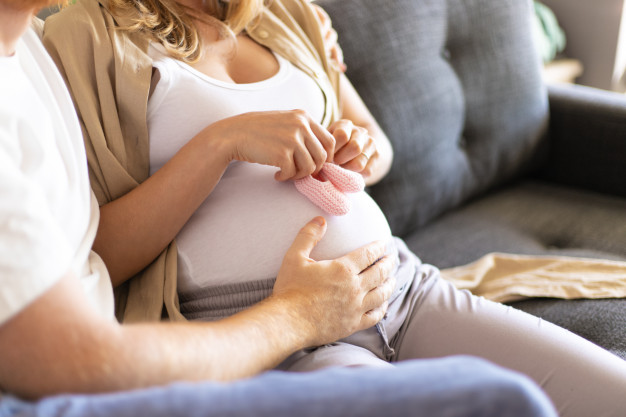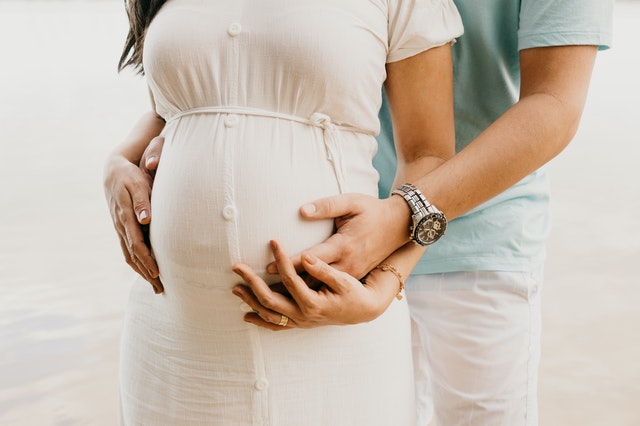Pregnancy is a very dynamic and powerful experience- your body adapts in ways you never thought were possible! This is no surprise, as your body is adjusting itself to nourish another life inside of you. The woman’s body undergoes several transformations during this period due to the secretion of hormones such as progesterone and estrogen. While you might love some changes, others might make you feel comfortable or even cause pain. These happen across 40 weeks, where each month brings new changes physically and emotionally. Here is a list of seven things that happen in your body while you are pregnant:
 I. Weight Gain and Fluid Retention
I. Weight Gain and Fluid Retention
Women experience weight gain during pregnancy, which increases with the growth of the fetus. This increase in weight consequently increases the body’s workload, i.e., it is more difficult to perform activities. As a result, blood and fluids’ circulation, especially in the lower part of the body, slows down. This leads to the retention of fluids and causes the swelling of limbs. Hence, pregnant women are advised to avoid long periods of standing. Caffeine and sodium lead to more fluid retention, so it must be avoided; however, potassium intake reduces fluid retention.
II. Increase in Blood Volume
Right from the first weeks of pregnancy, the volume of blood and plasma in the mother’s body increases from 30 to 50 percent. This is because your heart is working more efficiently, leading to the pumping of more blood with every heartbeat. This extra blood and plasma are instrumental in the development of the fetus. Gynecologists also suggest that this extra blood flow helps to avoid blood risks like hemorrhage. The entire cardiovascular system is adjusted to welcome the baby, leading to an elevated resting heart rate. The growing uterus also exerts pressure on the veins causing the slowing of blood during its return to the heart.
Also Read: How to Track your Basal Body Temperature and Ovulation?
III. Your Shoe Size gets Bigger
As previously mentioned, there is a lot of fluid retention during pregnancy, affecting your lower limbs. Pregnancy often causes feet and ankles to swell up. A study conducted by the University of Iowa showed that the production of relaxin, a hormone secreted by the ovaries and placenta during pregnancy, causes the arch of your foot to flatten. Furthermore, the increased weight of your body pressing on your foot loosens up your ligaments even more. Sixty to seventy percent of the women in the study reported that their feet had become wider and longer. However, this fluid dissipates after delivery, and hence, you can wear your favorite shoes again!
IV. You develop Brain Fog
A study in the Journal of Clinical and Experimental Neuropsychology revealed that almost 80 percent of pregnant women show symptoms of memory impairment. While the cause is largely unknown, doctors believe that this results from pregnancy-related hormonal changes and sleep deprivation or stress. Sometimes, this even extends to the period after the baby is born due to the overwhelming emotions and tasks associated with new motherhood.
V. Joint Mobility
The secretion of relaxin is to create more space around a woman’s pelvis for the growing fetus. This hormone loosens ligaments in the pelvis for comfortable labor and delivery and stretches ligaments and joints in other parts of the body. Unfortunately, this often causes sciatica which is the pain along the sciatic nerve- which begins at the lower back and extends up to your leg. Overall, relaxin causes some amount of instability due to the loosening of ligaments. This puts you at a larger risk of injuring yourself, especially in the region around your pelvis and back, and your knees. Doctors always advise pregnant women to exercise and lift objects slowly so that no sudden or jerking moment causes any pain or damage.
Also Read: Ovulation- how long does it last?
VI. Sensory Changes
Pregnancy has a very dramatic impact on the sensory experience as it affects the vision, taste, and smell. Pregnant women often face short-sightedness, which lasts only during pregnancy. Some women even report blurry vision. The sense of taste often becomes extreme as pregnant women’s tolerance of various tastes, including sourness, saltiness, and sweetness, increases drastically. This is due to dysgeusia, which is a diluted sense of taste. Many women also report a metallic taste in the mouth, which often causes nausea or vomiting. There is also a heightened sense of smell leading to sensitivity to specific odors, often meat.
VII. Mood Swings
Mood Swings during pregnancy are caused due to many factors. The main reason is pregnancy hormones – estrogen and progesterone. In the early stages of gestation, the secretion of these hormones increases significantly. Estrogen plays an important role in the part of the brain that regulates mood. Hence, estrogen secretion often causes a sense of irritability, anxiety, and even depression among pregnant women. Progesterone’s role is different as it aims to loosen the joints and muscles in the woman’s body. Consequently, it causes fatigue and sadness. Beyond hormonal imbalances, sleep deprivation and the general stress around pregnancy can cause irritability and mood swings.
Also Read: How To Talk To Your Partner About Fertility Issues
Many other changes occur during pregnancy, such as increased urination and changes in the skin, nails, and oral health. Being informed about the changes will help you keep track of your needs and also consult your doctor in case of any abnormalities or complications.

10 SIGNS TO LOOK FOR WHEN IN LABOUR
The due date is near, and you are probably waiting in happy anticipation for the D-day. The day you have been waiting for months while decorating the nursery of your little one. You are about to become a mother! So how to know when you are in labor, and this is not just a false alarm. It is especially difficult for women experiencing labor for the first time. Predicting your labor or noticing your pre-labor signs helps you be prepared and avoids the last-minute rush.
Every birth is different, so it might be tricky to predict your labor. But there are some tell-tale signs that you are about to meet your little one.

Labor sets off with the uterus’ contractions, which pushes the baby out of the mother’s womb and results in childbirth.
If you are nearing your due date, you might wonder how to confirm when you are in labor. Here are some signs which help you determine when you have entered the pre-labor stage. The symptoms can start showing from a month or a day before the labor.
Related Article: Freezing Embryos: A Lot Of People Are Turning For This Option
-
Your baby drops or descends into your pelvis.
Baby drop is a case that especially occurs in women’s first pregnancies, and the baby will start descending into the pelvis. The baby drop happens around two to four weeks before the labor begins. But the duration before the labor varies from case to case.
In the later pregnancies, this does not happen unless you’re already in labor. Your kid is getting in a position to make his way out, preferably with his shoulders down and his head out.
You might notice that you waddle even more than before. And you might still make frequent toilet breaks as you have probably been doing in the third trimester because your baby’s head is now pressing down your bladder.
Suggested Topic: Announcing Pregnancy: These Are The 15 Best Ways To Do That
-
The cervix dilates.
During your weekly home pregnancy check-ups, your provider may measure and track dilation and through an internal test.
But pregnancies progress differently, so do not be disheartened in case of slow or no dilation.
-
Increase in cramps and back pain.
Particularly if this is not your first pregnancy, you may feel some cramping and pain in your lower back and pelvic area as your labor nears. Your muscles and joints stretch and shift in preparation for birth.
-
You are clumsier
Your body releases the relaxin hormone during your pregnancy, which allows your ligaments to ease up a little. This hormone is the reason why you felt clumsy in the last trimester.
Before you go into labor, you can find that the joints around your body feel comfortable. It is just nature’s way to open your pelvis to your little one to make his way into the universe.
Also Read: How To Talk To Your Partner About Fertility Issues
-
Diarrhoea.
As the muscles in your uterus are relaxed preparing for birth, so are the other muscles in your body—including those in the rectum. And that can escalate to diarrhea, which is a severe labor symptom that you might have encountered at other periods during pregnancy.
-
Weight loss or weight stagnates.
Weight gain is often reduced at the very end of pregnancy. Some mothers even lose a few pounds. It is normal and will not affect your child’s birth weight. Your weight is falling due to reduced levels of amniotic fluid, more toilet breaks, and maybe even more exertion.
-
Feeling tired or feeling the need to organize.
The big belly, combined with your cramped bladder and other organs, will make it difficult to get a decent night’s sleep during the last days and weeks of pregnancy. So pile up your pillows and take your naps while you can, if at all possible.
That is until you feel the reverse of being super sleepy. Some moms get a surge of enthusiasm called nesting instinct, and you cannot fight the compelling desire to tidy up and organize everything in reach.
-
Losing your mucus plug and having thickened vaginal discharge
You may note your mucus plug comes out in one big piece or many little ones, but you do not get a sight of it at all because certain women won’t lose it before birth.
You will see thickened vaginal discharge in the last days before your labor. This thickened, pinkish discharge is considered a bloody display, a clear sign that you are going into labor.
But labor may still be a few days away without contractions or dilatations of 3 or 4 centimeters.
-
You feel stronger, more frequent contractions.
Contractions are a sign of labor, but in some cases, they are not. Braxton Hicks contractions or practice contractions is a fake alarm. Even though you feel the squeeze when the muscles in your uterus tense up in anticipation for their big moment: force the baby out.
In case of real labor:
- Contractions get progressively stronger.
- Despite changing positions, labor contractions do not go away.
- True contractions develop, getting more intense and uncomfortable as time progresses, frequently falling into a regular pattern.
-
Your water breaks
The water break is one of the last signs of labor faced by most women—and it happens to just about 15 percent of births or less. So please don’t wait for it.
Suggested Article For You
WHEN TO GO TO A DOCTOR? FROM PREGNANCY TILL BIRTH
Testing positive for pregnancy is beautiful as well as exciting. But the first thought that comes to your mind is when to visit your doctor? Here we have highlighted some points, from the beginning of your pregnancy journey to the final delivery. Read More:

